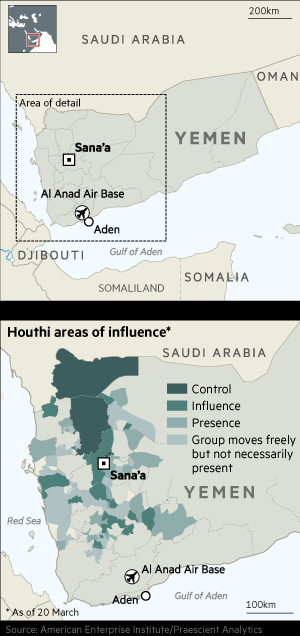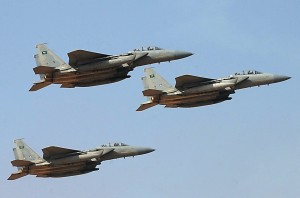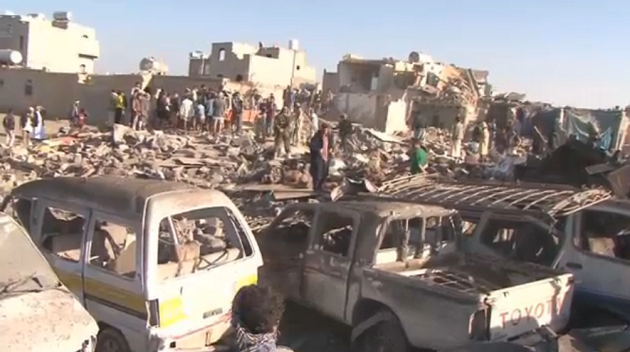Editor’s Note – As the White continues to insist that Yemen is a “model for successful counterterrorism“, the President of Yemen flees the country by boat.
Like many of the aspects of the Obama Administration’s foreign policy and “overseas contingency” operations, failure is obvious but they just will not admit failure and continue to cover for a failed President. One has to suspend all disbelief to swallow their statements.
Meanwhile, the Saudis have amassed military assets numbering over 150,000 on their border with Yemen and are now attacking the Houthis; the Iranians puppets and Iran is none-to-pleased. USA Today is reporting:
Iran’s Foreign Ministry said airstrikes in Yemen are a “dangerous step” Thursday, after Saudi Arabia launched the strikes against Shiite rebel positions in the crisis-hit country.
The Saudi offensive begun Wednesday and supported by nine regional allies came as the country pledged to protect its neighbor from Iran-backed Shiite rebels.
In a statement, Iran’s Foreign Ministry spokeswoman Marzieh Afkham said the country “condemns the airstrikes against Yemen this morning that left some innocent Yemenis wounded and dead and considers this action a dangerous step” the Associated Press reported. “This invasion will bear no result but expansion of terrorism and extremism throughout the whole region.”
Yemeni loyalists are fighting back but the Houthis are advancing despite air strikes. Yemen is in a state of total anarchy with many opposing forces, and the US has exited.
Despite these facts, the White persists through Josh Earnest, the White House Spokesperson:
QUESTION: Josh, just quickly first on Yemen. I know you’re asked this every time something terrible happens in Yemen. But — but now that we have, you know, essentially complete chaos in Yemen, does the White House still believe that Yemen is the model for counterterrorism strategy?
EARNEST: Jon, the White House does continue to believe that a successful counterterrorism strategy is one that will build up the capacity of the central government to have local fighters on the ground to take the fight to extremists in their own country. And the United States can serve both to diplomatically offer up some political support to central governments. We can offer very tangible support to local security forces in the form of training and equipping. (Read much more at ABC News)
Then, over at the State Department, Spokesperson Jen Psaki was in typical ‘protect the White House” mode about Yemen as well and she responded to news of President Abd-Rabbu Mansour Hadi:
“We were in touch with him earlier today,” State Department spokeswoman Jen Psaki told a briefing in Washington. “He is no longer at his residence. I’m not in position to confirm any additional details from here about his location.”

State Department Spokesperson, Jen Psaki and Josh Earnest respond separately to questions on Yemen and the White House’s stubborn stance of “success.”
See a stunning summary video of the chaos here. Please read on and do not let your ‘lying eyes’ deceive you:
Gulf states launch air strikes in Yemen
By Simeon Kerr in Dubai and Reuters in Washington – Financial Times
Saudi Arabia and its Gulf Arab allies have launched a military operation involving air strikes in Yemen against Houthi fighters tightening their grip on Aden, where the country’s president had taken refuge, the Saudi envoy to Washington said on Wednesday.
Adel al-Jubeir, the Saudi ambassador, said a 10-country coalition had joined the military campaign “to protect and defend the legitimate government” of President Abd Rabbuh Hadi.
News of the strikes triggered a surge in the price of crude oil. West Texas Intermediate, the US benchmark, was up 5.3 per cent at $51.80 in early London trade, while Brent crude, rose 4.5 per cent to $59.02.
Mr Jubeir said Saudi Arabia had consulted the US but that Washington was not participating. The White House confirmed that President Barack Obama had authorised US logistical and intelligence support.
Gulf Arab states had been considering military intervention against Iran-backed Houthi rebels advancing on Aden, Yemen’s southern port city, in what threatens to turn a rumbling Sunni-Shia cold war into a more direct conflict.
In a dramatic day of events — that saw reports of President Hadi fleeing the city by sea denied by his advisers, after Houthi forces stormed an air base near Aden — Yemen’s foreign minister told Sky News Arabia on Wednesday that Sunni Gulf states had accepted his government’s request for military intervention to stem the advance of Houthi militia.
The move sets the scene for a confrontation between Sunni-majority Arab countries and Shia Iran, which they accuse of interfering in the Arab world by supporting proxy groups such as the Houthi, who are followers of the Zaydi Shia sect.
Oil prices jumped in Asian trading on Thursday, with Brent crude, the international benchmark, at one point up 5.9 per cent to $59.71.
On Wednesday night, leaders from Saudi Arabia, the United Arab Emirates, Bahrain, Kuwait and Qatar who met in Riyadh last weekend to discuss the Yemeni crisis, were weighing up air strikes against Houthi positions in their northern strongholds in defence of Mr Hadi in the southern port city, said one person aware of the discussions.
Reports have since emerged that Saudi Arabia has moved heavy weaponry towards its southern border with Yemen, which adjoins the Houthis’ northern power base.
The Houthi rebels, who are working in partnership with the former president Ali Abdullah Saleh, seized the al-Anad air base on Wednesday, 60km north of Aden, the last staging post on the road to the country’s second-largest city — raising the stakes in the impoverished nation’s slide into war.
A spokesman for Mr Hadi, who escaped from the Houthi-controlled capital of Sana’a in February, denied rumours that the president had fled Aden by sea.
Clashes broke out around Aden’s airport later on Wednesday, according to local media. War planes fired at the compound where Mr Hadi has been forming a government in exile.
Analysts say that Saudi Arabia is adopting a defensive position on the Saudi-Yemeni border, which adjoins the Houthis’ territorial heartland, or perhaps seeking to draw the militia’s forces into a battle on a second front in the northern highlands.
Sunni Arab states may also be planning a joint force to weigh in behind Mr Hadi, whom they — along with the UN — have backed as the legitimate president.
“It is entirely possible that air strikes or special operation forces may be used on specific missions,” said Theodore Karasik, a Dubai-based security analyst. “There is a plan for a joint Arab force, but it is not ready yet for operations.”
On Saturday, US military personnel evacuated al-Anad base, which had been used to co-ordinate drone strikes against al-Qaeda Islamist militants.
The Houthis, who have controlled the capital since September, say their advance against Aden aims to stem the growing influence of al-Qaeda, which they claim has joined Mr Hadi’s coalition of army loyalists and southern tribes.
Analysts fear that al-Qaeda fighters, a potent force in central parts of Yemen, could become the shock troops of a Sunni defence — deepening the polarised sectarian conflict.
The Houthi advance south gathered pace after last week’s deadly suicide bombings at two mosques in Sana’a that caused hundreds of casualties among Zaydi Shia worshippers.
High quality global journalism requires investment. Please share this article with others using the link below, do not cut & paste the article. See our Ts&Cs and Copyright Policy for more detail. Email ftsales.support@ft.com to buy additional rights. http://www.ft.com/cms/s/0/cea43f62-d2e1-11e4-b7a8-00144feab7de.html#ixzz3VVlS3Tpo
Analysts said the Houthis’ rapid charge was intended to lock in territorial gains before potential foreign intervention or peace talks.
Saudi officials have said they will take the “necessary measures” if peace efforts — led by Jamal Benomar, UN envoy, in Sana’a — fail.
Qatar has sought to get key Yemeni power brokers to meet in Doha to forge a peace agreement but, so far, military action has trumped diplomacy.



